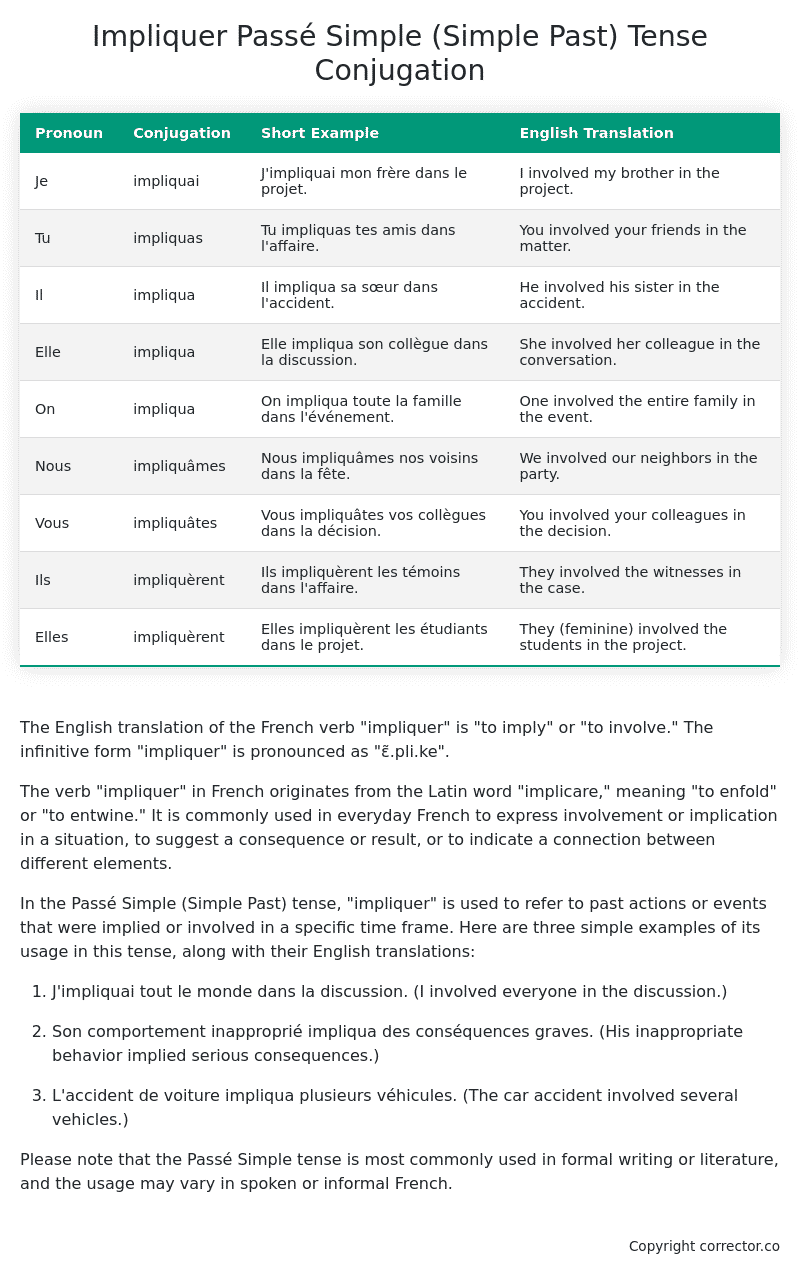Passé Simple (Simple Past) Tense Conjugation of the French Verb impliquer
Introduction to the verb impliquer
The English translation of the French verb “impliquer” is “to imply” or “to involve.” The infinitive form “impliquer” is pronounced as “ɛ̃.pli.ke”.
The verb “impliquer” in French originates from the Latin word “implicare,” meaning “to enfold” or “to entwine.” It is commonly used in everyday French to express involvement or implication in a situation, to suggest a consequence or result, or to indicate a connection between different elements.
In the Passé Simple (Simple Past) tense, “impliquer” is used to refer to past actions or events that were implied or involved in a specific time frame. Here are three simple examples of its usage in this tense, along with their English translations:
-
J’impliquai tout le monde dans la discussion.
(I involved everyone in the discussion.) -
Son comportement inapproprié impliqua des conséquences graves.
(His inappropriate behavior implied serious consequences.) -
L’accident de voiture impliqua plusieurs véhicules.
(The car accident involved several vehicles.)
Please note that the Passé Simple tense is most commonly used in formal writing or literature, and the usage may vary in spoken or informal French.
Table of the Passé Simple (Simple Past) Tense Conjugation of impliquer
| Pronoun | Conjugation | Short Example | English Translation |
|---|---|---|---|
| Je | impliquai | J’impliquai mon frère dans le projet. | I involved my brother in the project. |
| Tu | impliquas | Tu impliquas tes amis dans l’affaire. | You involved your friends in the matter. |
| Il | impliqua | Il impliqua sa sœur dans l’accident. | He involved his sister in the accident. |
| Elle | impliqua | Elle impliqua son collègue dans la discussion. | She involved her colleague in the conversation. |
| On | impliqua | On impliqua toute la famille dans l’événement. | One involved the entire family in the event. |
| Nous | impliquâmes | Nous impliquâmes nos voisins dans la fête. | We involved our neighbors in the party. |
| Vous | impliquâtes | Vous impliquâtes vos collègues dans la décision. | You involved your colleagues in the decision. |
| Ils | impliquèrent | Ils impliquèrent les témoins dans l’affaire. | They involved the witnesses in the case. |
| Elles | impliquèrent | Elles impliquèrent les étudiants dans le projet. | They (feminine) involved the students in the project. |
Other Conjugations for Impliquer.
Le Present (Present Tense) Conjugation of the French Verb impliquer
Imparfait (Imperfect) Tense Conjugation of the French Verb impliquer
Passé Simple (Simple Past) Tense Conjugation of the French Verb impliquer (You’re reading it right now!)
Passé Composé (Present Perfect) Tense Conjugation of the French Verb impliquer
Futur Simple (Simple Future) Tense Conjugation of the French Verb impliquer
Futur Proche (Near Future) Tense Conjugation of the French Verb impliquer
Plus-que-parfait (Pluperfect) Tense Conjugation of the French Verb impliquer
Passé Antérieur (Past Anterior) Tense Conjugation of the French Verb impliquer
Futur Antérieur (Future Anterior) Tense Conjugation of the French Verb impliquer
Subjonctif Présent (Subjunctive Present) Tense Conjugation of the French Verb impliquer
Subjonctif Passé (Subjunctive Past) Tense Conjugation of the French Verb impliquer
Subjonctif Imparfait (Subjunctive Imperfect) Tense Conjugation of the French Verb impliquer
Subjonctif Plus-que-parfait (Subjunctive Pluperfect) Tense Conjugation of the French Verb impliquer
Conditionnel Présent (Conditional Present) Tense Conjugation of the French Verb impliquer
Conditionnel Passé (Conditional Past) Tense Conjugation of the French Verb impliquer
Conditionnel Passé II (Conditional Past II) Tense Conjugation of the French Verb impliquer
L’impératif Présent (Imperative Present) Tense Conjugation of the French Verb impliquer
L’impératif Passé (Imperative Past) Tense Conjugation of the French Verb impliquer
L’infinitif Présent (Infinitive Present) Tense Conjugation of the French Verb impliquer
L’infinitif Passé (Infinitive Past) Tense Conjugation of the French Verb impliquer
Le Participe Présent (Present Participle) Tense Conjugation of the French Verb impliquer
Le Participe Passé (Past Participle) Tense Conjugation of the French Verb impliquer
Struggling with French verbs or the language in general? Why not use our free French Grammar Checker – no registration required!
Get a FREE Download Study Sheet of this Conjugation 🔥
Simply right click the image below, click “save image” and get your free reference for the impliquer Passé Simple tense conjugation!

Impliquer – About the French Passé Simple (Simple Past) Tense
Formation
Usage
Narration
Historical Context
Interactions with other tenses
Passé Composé
Imparfait
Conditional and Subjunctive
Summary
I hope you enjoyed this article on the verb impliquer. Still in a learning mood? Check out another TOTALLY random French verb conjugation!


